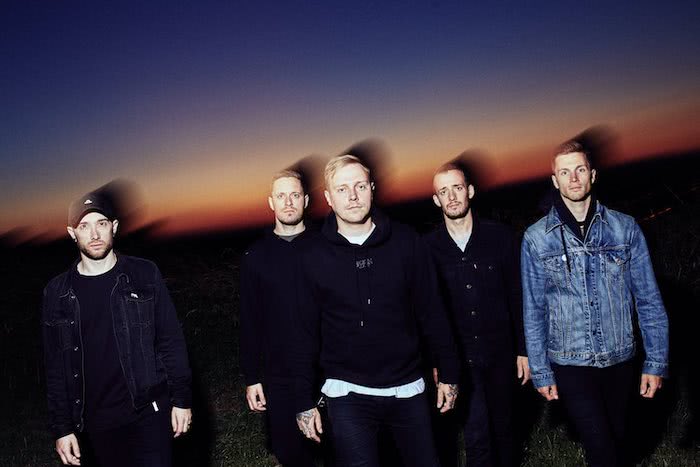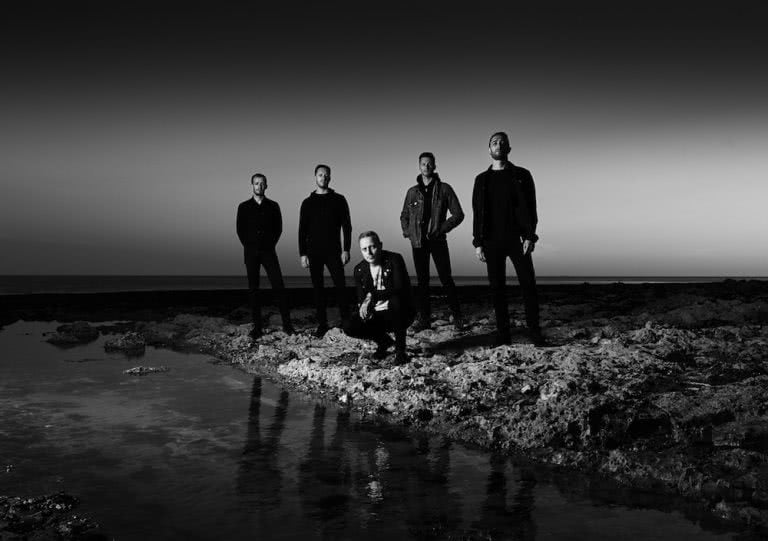In August of 2016, Tom Searle, guitarist from UK metalcore outfit Architects passed away following a brave, three-year battle with cancer. Losing a brother-in-arms, and in this instance, an actual brother is reason enough for a band to down tools, but not for Architects. In fact it wasn’t even an option.
Since Tom’s passing, Architects have continued to honour his memory while refusing to lose any momentum. Those of you in attendance at their stadium tour with Bring Me The Horizon in 2016 surely still have goosebumps from the shows and if the ringing in your ears had started to subside, well, their brand new album Holy Hell can fix that.
Holy Hell is devastatingly brilliant
A harrowing and unpredictable look at loss. A mood piece you don’t necessarily listen to, so much as you sit in. The agency Holy Hell held within their camp shines through in the language vocalist Sam Carter uses to explain how he feels it went down, Holy Hell wasn’t a success, nor was it a big achievement: “It’s a victory, really.”
Delving into the story of Holy Hell reveals that this was a hard fought victory at that. While on paper, the idea of turning such striking trauma, sadness and pain into a record seems fluid enough, the actual process was far more complicated emotionally, physically and artistically than anyone anticipated.
Compound that with the cunning and baffling behaviour of grief, and Holy Hell presents a fairly unique case all together.
“The album was like a safety blanket for me in a way”, Drummer and Tom’s brother Dan Searle begins, explaining that even once the album was finished, releasing it to the masses was going to be just as emotionally demanding as writing it was.
Stream Holy Hell below:
The band could have been forgiven for avoiding this altogether, and releasing an album void of any reference to Tom, perhaps an album inspired by politics or socio-economic stimulants as they had done in the past.
But speaking with them, it becomes incredibly clear that without any prompting, the whole Architects camp knew what Holy Hell needed to be about.
“We didn’t really give a fucking shit about anything else over the last two years,” explains Sam.
“For the last two years, we’ve had to look pretty inward to try and get through it and try and figure out life without Tom and figure out this journey. So, to go and write a political record would have felt very fake almost and just not been real enough.”
Holy Hell was going to be, at its core, an album about grief. It was decided.
“My intention was to create this chronological journey of grief”, Dan recalls of the early war room talks discussions. Not unlike a concept album, Holy Hell, initially, was meant to document the stages of grief one at a time.
“But that’s not the way grief is,” says Sam; sentiments that Dan backed up once he too realised that the baffling and cunning thing about grief is, “it’s not uniformed, it’s not a straight line.”
To go and write a political record would have felt very fake almost and just not been real enough
It was around this time that Holy Hell began to take its final form: a meandering, cyclonic study of the highs and lows as well as the good moments, and the bad moments that sneak up on them.
In essence, Holy Hell is unpredictably volatile, primed to explode at any moment because, as they explain, “That’s what grief is.”
Architects may now have found an authentic way to tell the story of Tom Searle
But by this point, the struggle to bring Holy Hell to life was far from over.
“We were so exhausted and broken from doing everything we possibly could to keep Tom alive because we loved him and didn’t want to admit to ourselves that things were getting worse.”
You can imagine the last thing you would want to do following the death of a brother and a dear friend is to return to work. But as Sam explains, they saw no other option.
“I had to try and be more positive because that’s what Tom would have wanted.”
The task was now upon the band to tell this story; to bring the lessons and energy of Tom out from their inner circle to share it with fans all over the world.
Such a task was always going to be difficult, but as the band would learn, “It was extremely difficult.” No doubt due to the fact that Tom was Architects primary songwriter.
“Make no bones about it” Sam stresses, “it was so hard…Every day it was like, fuck this. Just fuck this…”
“Dan was writing lyrics about his brother and I was singing lyrics about his brother from his point of view and from my point of view, that was my best friend.
“Musically, there is the stress of trying to get it right as well, trying to create something that is a step above what we’ve done before, which is fucking hard because Tom was, I think, the best songwriter ever. I loved his musicianship.”
It was so hard…Every day it was like, fuck this. Just fuck this…
Watch the clip for ‘Royal Beggars’ below:

“I don’t think anyone fully understands how it comes about” adds Sam, “and how these materials – how the musical concepts – go from nothing to something. It’s strange how things come together.”
As for Dan, you can imagine the trauma being felt even deeper. Dan explains he too felt the burn described by his band mates at the beginning of the Holy Hell sessions, but he dissects this further “What was difficult for me was that I was angry; I was angry on the outside.”
Once they found their footing, and reached a level of mental and emotional balance, the band was soon finding beauty and hope in the decision to fill an album with grief and pain.
What was difficult for me was that I was angry; I was angry on the outside
Sam recalls the vocal sessions that would usually entail himself and Dan painstakingly picking apart each word to ensure that it earned its place on the final cut.
“It was just me and him tracking the vocals every day, trying to make sure that we were getting everything perfect, which I think we were very close to.”
Indeed, the vocal performance on Holy Hell has been one of the most remarkable we’ve ever seen from the band. The lyrical content isn’t just sung, or performed, it’s lived and it’s felt.

You don’t hear the pain in Sam’s voice so much as you feel it coming out from within yourself
The band attribute this to having more time in the studio, and better mics, but as a fan, one could be forgiven for thinking it had something to do with the writing sessions.
It was a real journey of, “Okay, so I’ve written this, and this is what this is about. What’d you think of this? And could we do this bit better? And this is why I’ve decided to write this piece.”’
After sitting on the album for months, Holy Hell is now out, and in the hands of the masses. To gauge the success of an album like Holy Hell is challenging.
This success can’t be measured in album sales or charts. Perhaps a more accurate metric would be total souls that this album touches, or the number of lives this album puts back on course. Or the amount of people helped through the grieving stages.
Watch the clip for ‘Doomsday’ below:

As Dan explains, “you think about something like that happening in your life and in that proximity and it’s frightening and painful.”
One thing both Sam and Dan noticed throughout the process is how fundamentally underprepared Western culture is for death, and how ham-fisted the topic is usually treated.
“Death is really not spoken about. It’s really frowned upon to talk about it because people are so scared of it.”
“When people die, it’s buried behind closed doors. You don’t see the body, you see people get rid of it, and then the loved ones just go on. I know it’s not the same for all religions around the world. I’m sure there’s different ways of dealing with it, but in the west, I think we’ve got it very, very wrong.”
This adds even more cultural importance to Holy Hell. In a society that addresses death as a taboo topic, the more content we have that discusses death, loss, grief, the more emotionally mature we can become on the topic.
When people die, it’s buried behind closed doors. You don’t see the body, you see people get rid of it, and then the loved ones just go on
Holy Hell is the warts and all comment section on death that we are regularly denied
Architects have now gone through something that ruins most bands, and come out the other side stronger and more balanced as humans and artists.
Rather than disappearing into their private quarters the band let us, the fans, grieve with them. And the world noticed. Architects are now at a new dawn in terms of their career as a band.
“We’ve moved into arenas in England, which is absolutely crazy. We’re playing Wembley and we just started getting offers for festivals and making plans around the world.
“Everything is bigger than it ever has been”, Sam says.
Dan reiterates a plan to enjoy this growth and “live in that moment. Then, afterwards whatever comes, comes.”
“It was all really difficult. It was very hard. But you know, that’s art, isn’t it?” Sam ponders…
…“Pain is a gift if you want it to be.”
Watch the clip for ‘Hereafter’ below:


































